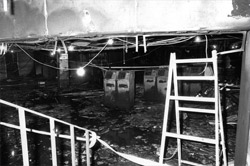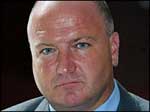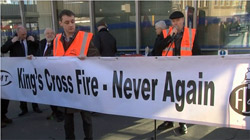RMT Raise Safety Concerns On 25th Anniversary Of King’s Cross Fire
Bob Crow, General Secretary of the RMT has accused the proposed budget cuts being introduced by London Transport of returning the safety of the London underground back to the old days prior to the 1987 King's Cross fire which killed 31 people.
 Behind the case for cuts is Mayor of London Boris Johnson's "threat" to cut station and platform staffing levels and introduce driverless.
Behind the case for cuts is Mayor of London Boris Johnson's "threat" to cut station and platform staffing levels and introduce driverless.
Members of the Rail, Maritime and Transport Workers union (RMT) gathered outside King's Cross station in London to remember the 31 people who died there after a fire on an escalator on November 18, 1987.
In a press release issued prior to yesterday’s memorial event at Kings Cross station, the RMT said:
The demonstration is especially important in light of London Underground documents, which have been seen by RMT, which plan to impose an unattended network including de-staffing stations and introducing automated trains, measures which would necessitate the ripping up of the safety regulations, including minimum staffing levels, which were introduced in the aftermath of the Kings Cross tragedy.
RMT General Secretary Bob Crow said:
“This Sunday we will mark the 25th anniversary of one of the greatest peace-time disasters to hit London when, due to a culture of complacency and systemic failure, 31 people lost their lives in the fire at Kings Cross underground station.
We are marking the event with a public demonstration to send out the message that never again must the London Underground be dragged back to the same catalogue of complacency and failures which led us to Kings Cross.
RMT, our trade union colleagues, politicians and the community will be calling on Boris Johnson and his officials to end once and for all the threatened cuts to station and platform staffing levels, the cuts to maintenance schedules and the persistent threat to bring in driverless trains, threats that Boris Johnson raised once again at the Tory Party conference only a few weeks ago.
All of that posturing and corner-cutting has to stop and the safety regime introduced after Kings Cross must be both protected and developed to meet the modern challenge of ever greater tube passenger numbers.”
The press release continued:
 The King's Cross fire broke out on 18th November 1987 at approximately 19:30 at King's Cross underground station and killed 31 people. The fire started on an escalator serving the Piccadilly Line and approximately fifteen minutes after being reported, just as the first members of the Fire Brigade were investigating, the fire reached flash point, filling the underground ticket office with heat and smoke.
The King's Cross fire broke out on 18th November 1987 at approximately 19:30 at King's Cross underground station and killed 31 people. The fire started on an escalator serving the Piccadilly Line and approximately fifteen minutes after being reported, just as the first members of the Fire Brigade were investigating, the fire reached flash point, filling the underground ticket office with heat and smoke.
The public inquiry led to strong criticism of London Underground and their safety regime and the fact that staff had been given little or no training to deal with fires or evacuation. The publication of the report lead to resignations of the senior management at London Underground and led to the introduction of new fire safety regulations. RMT says that those regulations, staffing levels and safe working practices are threatened by the current cuts regime within Transport for London.
As he laid a wreath at the foot of a plaque inside the station dedicated to the victims' memory Bob Crow said:
"We are here today first of all to show our sympathy and our condolences to the people who lost their lives 25 years ago.
I worked for London Underground 25 years ago, I remember that night still vividly.
It could have been me travelling home, my family, my friends, it could have been you, it could have been anyone that particular night."
He continued:
"What we are seeing now is a number of people who want to reduce costs if they can. We can't allow for the accountants of Transport for London or the Government to try and reduce the staffing and make it unsafe for London Underground workers and the people that use the Tube."
 Among those killed was fireman Colin Townsley who was posthumously awarded a certificate of commendation for his bravery, as were five other firemen who survived. The fire caused injury to over 100 people who were taken to hospital. Smoking was immediately banned on all parts of the Underground after the fire and wooden escalators were replaced.
Among those killed was fireman Colin Townsley who was posthumously awarded a certificate of commendation for his bravery, as were five other firemen who survived. The fire caused injury to over 100 people who were taken to hospital. Smoking was immediately banned on all parts of the Underground after the fire and wooden escalators were replaced.
Commenting upon the plans to cut station staff and introduce driverless trains, Unionsafety editor, Chris Ingram said:
“That night in 1987, I was due to travel to Bedford from Kings Cross and would have been entering the station at the time of the fire. Due to a very hectic day at union HQ preparing the next edition of the union’s clerical paper ‘Link’, I changed my mind whilst on the underground and got off at Euston.
When being told of the fire by hotel staff, I was shocked that I could have been caught up in what was, as always is in such cases, a preventable fire that took lives.”
He continued;
“The idea that fewer station staff and driverless trains will have no consequence for public safety is absurd at best and callous at the worst.
Only a total idiot would introduce either of these cost cutting measures, and someone who is contemptuous of the health and safety of workers and the public using the underground and trains.”
Source: RMT / Getty Images / Unionsafety